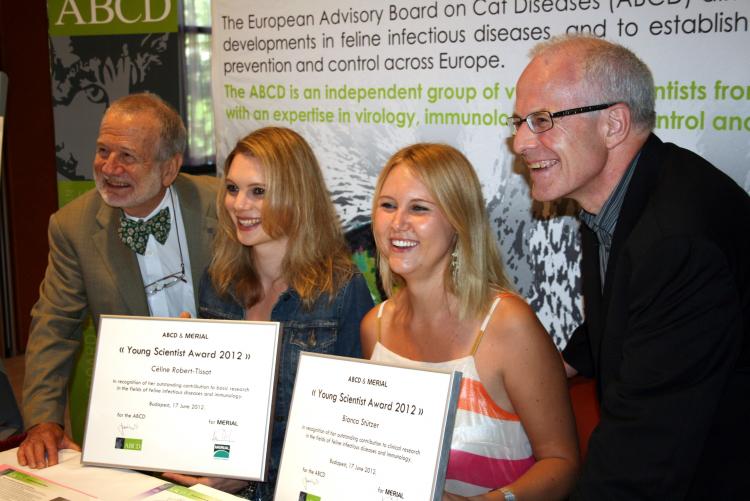This year, two ABCD & Merial Young Scientist Awards (AMYSA) were presented, one for Basic research and one for Clinical research. The award ceremonies took place on 17 June in Budapest, at the occasion of the congress of the International Society of Feline Medicine.
Basic research award: Céline Robert-Tissot
The 2012 AMYSA for Basic Research was presented to Dr vet med Céline Robert-Tissot, PhD, of the Clinical Laboratory, Vetsuisse Faculty, University of Zurich (Switzerland), for her work entitled "The innate antiviral immune system of the domestic cat".
“The jury based its decision on the submitted material, but also on past performance in research, the number and quality of the supporting publications and the respective journal impact factors, explained professor Marian C. Horzinek, chairman of the European Board on Cats Diseases (ABCD). “The winning study was well-structured and indicated possible applications.” He also lauded the sheer amount of work and the experimental sophistication.
Dr Robert-Tissot’s award application concerned the immunomodulatory effects of ODN 2216, an oligonucleotide that induced the most potent response in feline cells. Moreover, the supernatants of ODN 2216-stimulated cells inhibited the replication of feline calici-, herpes-, parvo-, corona- and leukaemia viruses.
Clinical research award: Bianca Stützer
The 2012 AMYSA for Clinical Research went to Dr med vet Bianca Stützer from the Medizinische Kleintierklinik, Ludwig Maximilian University, Munich (Germany) for her submission of "Role of regressive feline leukaemia virus (FeLV) infection in cats with non-regenerative bone marrow suppression or lymphoma".
“Conclusions of her work will be highly appreciated by general practitioners, commented Albert Lloret, jury member, ABCD vice president and lecturer at the Veterinary Teaching Hospital, of the Universitat Autónoma de Barcelona (Spain).
FeLV is one of the most common fatal pathogens in cats, and may lead to proliferative, neoplastic and degenerative disorders. These, however, are also seen in FeLV antigen-negative animals, and frequently, no underlying process can be found. A regressive FeLV infection, undetected by routine antigen testing is then suspected. However, Dr Stützer’s study found that only 5% of cats with non-regenerative cytopenia and 0% with lymphoma or leukaemia had been regressively infected by FeLV.
ABCD & Merial Young Scientist Awards
The awards were presented in Budapest by Professor Marian C. Horzinek (ABCD), and Dr Jean-Christophe Thibault, Merial’s Technical Director for Biologicals (Europe, Middle East and Africa).
The ABCD and Merial Young Scientist Award, created in 2008, is funded by Merial and is presented to a young scientist in veterinary or biomedical sciences, who has made an original contribution in the field of feline infectious diseases and/or immunology. Applicants should have published their findings in a journal listed in PubMed or Web of Science or have had them accepted by another recognised assessing body.
Candidates should be based in Europe, have completed a veterinary or biomedical curriculum, and be under 35 years of age at the time of application. Applications in the fields of both basic and applied sciences are welcome.
For further information, please contact Karin de Lange, ABCD secretary, karin.delange@abcd-vets.org
gPhotos attached. Caption photo 1: ABCD & Merial Young Scientist Award winners Céline Robert-Tissot and Bianca Stützer flanked by professor Marian Horzinek (ABCD), at left and Jean-Christophe Thibault (Merial). Caption photo 2: ABCD & Merial Young Scientist Award winners Céline Robert-Tissot and Bianca Stützer.
gThe European Advisory Board on Cat Diseases (ABCD) is an independent panel of 17 leading veterinarians from eleven European countries, with an expertise in immunology, vaccinology and/or feline medicine. The ABCD was set up to compile guidelines for the prevention and management of major feline infectious diseases in Europe, based on current scientific knowledge. For more information, please visit www.abcd-vets.org.
gMerial is a world-leading, innovation-driven animal health company, providing a comprehensive range of products to enhance the health, well-being and performance of a wide range of animals. Merial employs approximately 5,600 people and operates in more than 150 countries worldwide.Its 2011 sales were more than €2 billion ($2.8 billion). Merial is a Sanofi company. For more information, please see http://www.merial.com.
